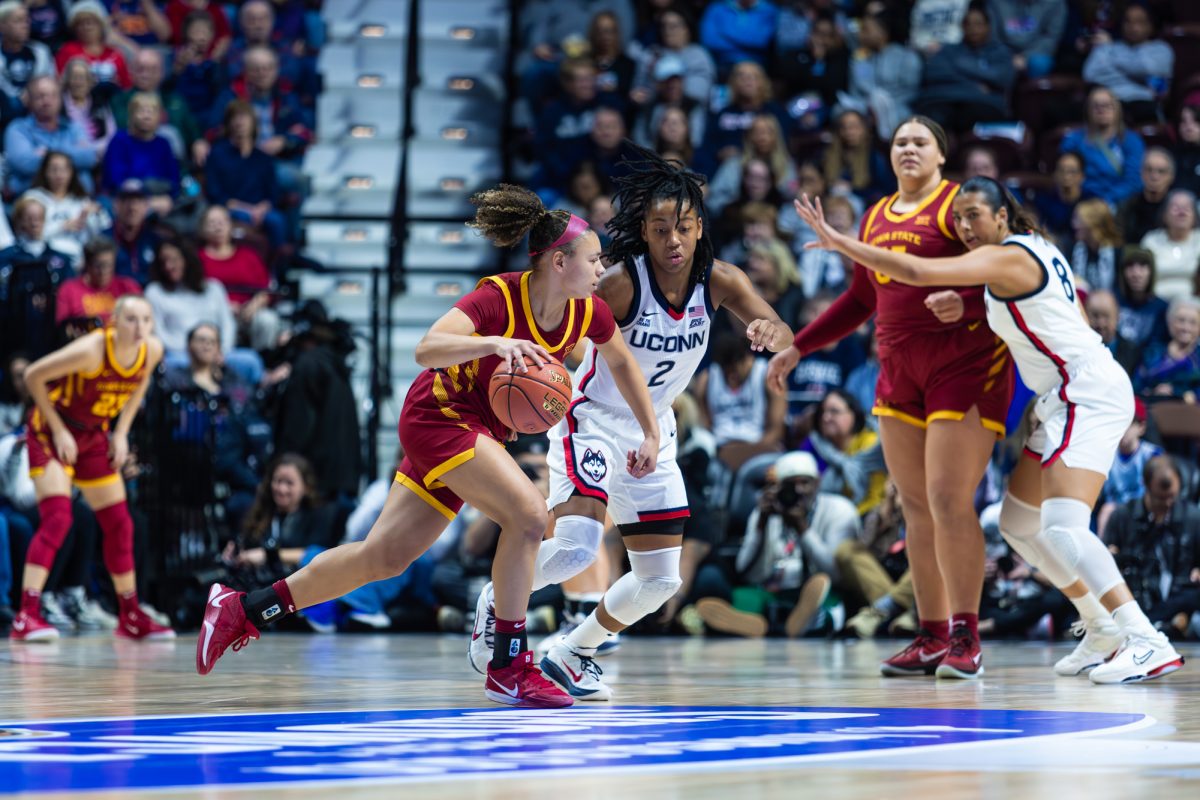The consequences of a coach’s confession
May 4, 2003
Barefoot and clad in navy Iowa State sweatpants and a gray Cyclone football sweatshirt, Larry Eustachy answered his front door to a small group of reporters hoping to speak to the men of the minute — two members of the ISU men’s basketball coaching staff.
“How’s it going, guys?” he asked warmly. “Come on in.”
Walking into his living room, Eustachy grabs a bottle of O’Doul’s — a nonalcoholic beer — inviting his guests to sit. He jumps back up from his chair, however, when the doorbell rings again — there are more fans to acknowledge.
“Hey, Coach, we brought you some doughnuts!”
A photographer’s camera flashed.
“No pictures — that’s what got me in trouble,” Eustachy said with a dry laugh, thanking the fans and closing the door.
At 11:30 on a Thursday night, the 47-year-old coach doesn’t resemble the raging maniac fans regularly see on the basketball court. He speaks softly but firmly, answering the slew of questions fired at him.
Eustachy’s been through the wringer tonight, and it shows. After evening interviews with local television stations KCCI, WOI and WHO, the coach has an early morning and a long day ahead of him — a 6 a.m. interview with “Good Morning America,” for starters.
“You wish it were under the circumstance of winning a national championship or something like that,” Eustachy said, referring to the media frenzy surrounding his suspension from coaching. “I don’t know why it’s taken on a life of its own.”
Eustachy said he’s grateful for the support from Cyclone fans — it’s not every day students camp out on his lawn and rally in his name on Central Campus during Dead Week.
Jeff Calentine, junior in horticulture, said he and his friends saw Eustachy interviewed on television and decided to come to the coach’s house to show their support.
“He admitted he made a mistake,” said Calentine, blinking in the flood lights of a TV station’s satellite truck parked in Eustachy’s driveway.
“I know he’s glad we’re out here.”
The coach has always had his critics, however — now more than ever. Eustachy said that even at the “highest point” of his career, 30 percent of sports fans probably didn’t like him.
“Is there a poll out there — you like him, you don’t like him?” he asked sarcastically.
“I think those people would fight me anyway.”
He speaks frankly about his disease, the alcoholism he says he admitted to himself one month ago and announced at a press conference Wednesday.
“I had two Miller Lites 16 days ago,” he said.
Where?
Eustachy gestures to a wheat-colored couch across the living room.
“Right there.”
Calling himself a “functional alcoholic,” Eustachy said he realized the effects his drinking had on his family and his job — he drank both at home and on the road.
“Alcoholism makes you very selfish,” he said.
“When the day was over, I’d drink.”
The coach sought treatment, outside of Iowa, while the public thought he was conducting his spring recruiting.
“My counseling meeting was on Bourbon Street in New Orleans,” he said, chuckling at the irony.
ISU basketball players have publicly announced their support for their coach — juniors Jackson Vroman and Tim Barnes have declared they plan to leave the university if their coach does.
But Eustachy said those plans wouldn’t be in the players’ best interest.
“The Jackson Vromans and Tim Barneses of the world need this to work out — they need to stay,” Eustachy said.
“If I don’t coach here, they’ll get a good coach.”
As the coach continues to answer questions, assistant coach Steve Barnes wanders into the room, talking on a cell phone. Spotting the media, Barnes turns and walks away.
Earlier in the evening, Barnes was also suspended by the university in connection with an intimidating phone call to the family of one of his players.
Eustachy said the assistant coach was trying to defend him.
“Things get turned around easy,” Eustachy said. “He was trying to stick up for me.
“He’s hurt right now — he doesn’t deserve what’s happened to him.”
Eustachy’s got plans for his appeal, and realizes the magnitude of the situation.
But he questions the university’s decision.
“Does the crime fit the punishment?” he asks. “I don’t know.”






